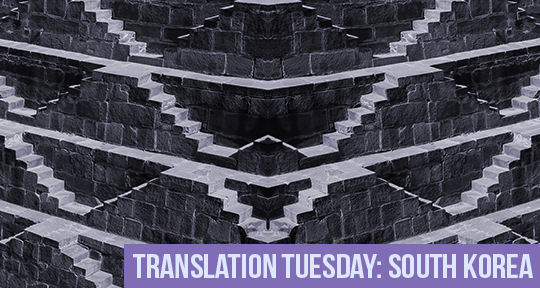Part of the Green Deer school of poetry that emerged in the aftermath of Japanese rule, the celebrated South Korean poet Cho Ji Hoon was one of the most distinguished poets of modern Korea. This Translation Tuesday, we bring to you two of Cho’s poems translated by Sekyo Nam Haines that evoke the complex folds of longing and distance through their meditations on the simplicity of a door or a road.
Stone Door
There is a stone door that will open at the brush of your fingertips, without a sound.
Many people are anxious about it, but since the door has been shut, within the stone walls, the green moss grows on the shelves of twelve stair cases.
Until the day you return, I keep a stick of candlelight that will never burn out.
As long as your longed face reflects faintly in the dim light, even if a thousand years
pass, my sad soul will not close my eyes.
What are those few dewdrops that always linger on my long lashes?
Should I dry my tears with the blue linen robe you left behind?
My two cheeks still look peach colored as before, but what shall I do with
my long sighs that turn my lips blue?
After crossing several thousand miles of turbulent river, you return and your warm hand strokes my white nape, I will vanish, without a trace, to a handful of dust. In the night sky, like wind, my strip of garment vanishes into empty space, cannot be seen unless one’s eyes are full of tears.
Here is a stone door. It will not open even with the most sincere effort. The animosity is too deeply entrenched. While waiting for you to come back and sit inside for another thousand years to wait, there is a stone door that decays from wind and rain.
Road
The time accompanies me always. The time cannot drop me.
Only the time doesn’t know how to drink.
When I go to a tavern and have a drink and fall asleep, the time goes alone a little ahead of me,
then, it waits for me. Startled, I get up quickly and run out to catch up with the time. I am already getting ahead of the time. I get a shortness of breath. I faint on the roadside.
Another time runs to me and helps me to get up. Quietly, I walk again. The older time that was ahead of us, comes to us and sits down on the grass. Both times start talking to each other in whispers. I am alone; as I wait for them, I move a little forward.
I need to stop at the tavern again to have another drink. After slugging down a big glass, I watch people fight, soon join in the shouting match and ends up being held by the throat.
Finally, I sing a long song letting my voice go smoothly over the highest notes. By then, the sun is setting.
The new time brings me a folded piece of paper. A last will from the dead time!
I open the piece of paper. Written in it, was the song, I had sung to him.
Translated from the Korean by Sekyo Nam Haines
Born in 1920, Cho Ji Hoon is a canonical poet of modern Korea and a renowned traditionalist of Korean aesthetics. Although his poetry is written in a modernist free verse form, his poems resonate with the deep root of Korean literati Sijo and have an intense local flavor that is imbued with the sounds, smells and colors of the Korea before industrialization. In 1939, at age 19, Cho Ji Hoon published his first poem in literary magazine MoonJang. In 1946, he published his collection of poetry, Cheongnok Zip (청록집) alongside with the poets Park Mokwohl and Pak Doo Zin. They were known as “Cheongnokpa,” the Green Deer Poets. A professor of Korean language and literature at Korea University for 20 years, he served as the president of the Korean cultural society affiliated with the university and president of the Korean poet’s association. He received numerous literary awards, published five poetry collections, and numerous books related to Korean literature and culture.
Born and raised in South Korea, Sekyo Nam Haines immigrated to the U.S. in 1973 as a registered nurse. She studied American literature and writing at Goddard College ADP and poetry with the late Ottone M. Riccio in Boston, MA. Her first book, Bitter Seasons’ Whip: The Translated Poems of Lee Yuk Sa was published in 2022, April by Tolsun books. Her poems have appeared in the anthologies Do Not Give Me Things Unbroken, Unlocking The Poem, and Beyond Words; and in the poetry journals Constellations, Off the Coast and Lily Poetry Review. Her translations of Korean poetry by Cho Ji Hoon are forthcoming in The Tampa Review, Tupelo Quarterly, and poetry of Kim Sowohl and Lee Yuk Sa have appeared in The Harvard Review, Brooklynrail: InTranslation, Adelaide Literary Magazine, Ezra, Circumference, The Massachusetts Review, and Notre Dame Review. Her translation of “The Dire Pinnacle” by Lee Yuk Sa appeared in The Anthology of Best Work in Translation by The Massachusetts Review. Sekyo lives in Cambridge, MA with her family.
*****
Read more from Translation Tuesdays on the Asymptote blog:

